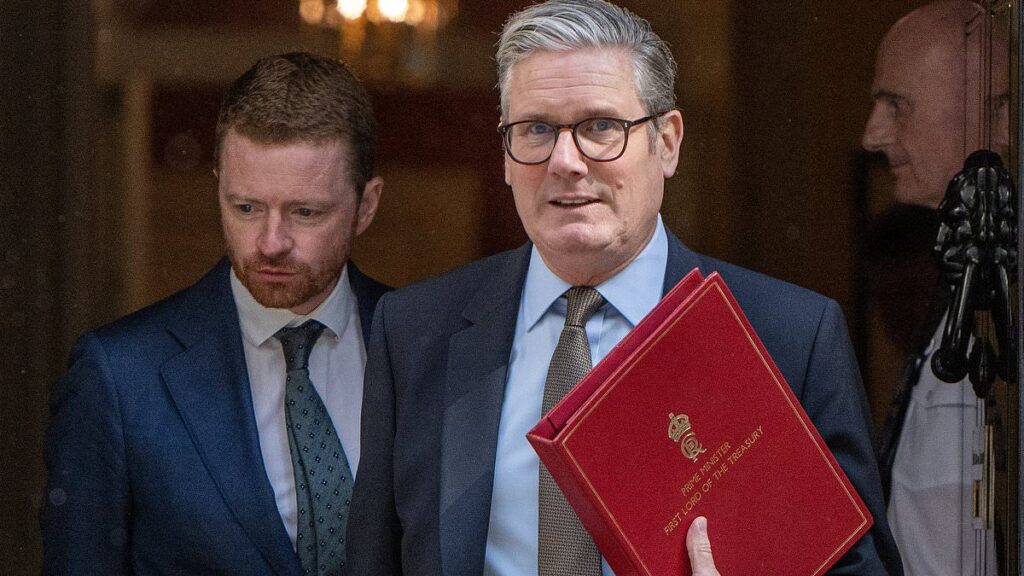What should have been a routine session of Prime Minister’s Questions turned into a jaw-dropping, emotionally charged spectacle in the House of Commons.
Chancellor Rachel Reeves couldn’t hold back tears throughout the session, her face visibly streaked with emotion as political chaos swirled around her.
The Prime Minister, Sir Keir Starmer, was asked directly whether he would stay in office—and instead of offering reassurance, he spoke of his leadership in the past tense.
It was a moment that left Westminster reeling.
A Government on the Brink
The image of Reeves in tears only intensified the perception that the Labour government is teetering on the edge.
Just back from a NATO summit, Starmer had sat down with close aides to take stock of growing unrest over the controversial welfare bill.
The message was grim—Labour MPs were ready to revolt.
In a moment of rare self-awareness, Starmer admitted, “It’s my fault. I haven’t been focused enough.”
But one of his advisors quickly shot back: “You’re Prime Minister.
You can’t say things like that. You can’t show weakness.”
A Clumsy Defense and a Collapsing Front
By the weekend, Starmer was trying to control the narrative, telling journalists he’d been laser-focused on NATO and the Middle East and had only turned to the welfare issue upon returning.
But by then, it was too late. The damage was done.
In a historic and self-inflicted political disaster, Starmer—despite commanding a 170-seat majority and nearing his first year as Prime Minister—has watched his authority implode.
Reactions from Within: Confusion, Mockery, and Anger
Loyal Labour supporters were baffled. “What a complete s*** show,” said one.
Another, speaking with disbelief, asked, “What the hell happens now?” Some even mocked the moment as a supposed “triumph” of a listening government.
What’s really happened, though, is that Starmer’s grip on power has been completely shattered.
After the welfare vote, the Commons terrace was buzzing with celebration—not among ministers, but among Labour rebels.
Backbenchers were hugging, high-fiving, and feeling emboldened. MP Rachael Maskell even declared that power had shifted.
She wasn’t wrong—it didn’t shift so much as gush out like a ruptured pipe.
Starmer’s Retreat Has Only Just Begun
More retreats are coming—on welfare, yes, but also on tax and education policy.
Starmer didn’t even put up a real fight on the welfare issue.
Labour’s chief whip, Alan Campbell, has taken heat for weak enforcement, but the truth is MPs were effectively told they wouldn’t be punished if they rebelled.
That green light from the top turned rebellion into policy.
Pressure Mounts in No.10—and It’s Getting Personal
As blame swirled, attention turned to Starmer’s inner circle.
His Chief of Staff, Morgan McSweeney, is under fire from all sides.
Starmer has defended him, warning Cabinet members to stop the anonymous attacks.
But even his allies admit McSweeney might need a new role—he’s a campaign strategist, not a policy fixer.
Names like Jonathan Powell (Tony Blair’s old hand), Pat McFadden (the steady and strategic Cabinet veteran), and Baroness Louise Casey (already nudging government policy from within) are being floated as possible replacements.
But reshuffling staff won’t be enough to stop the rot.
The Real Shake-Up? Starmer’s Job Is on the Line
The most significant fallout from this mess may be that Starmer himself is now under serious threat.
Behind the scenes, Labour’s next leadership contest has already started.
Angela Rayner, Starmer’s Deputy, is being credited with brokering the peace deal with rebels.
She’s taking a calm, statesmanlike tone on TV, but behind the scenes her team is moving.
Wes Streeting and Andy Burnham Enter the Ring
Meanwhile, Health Secretary Wes Streeting is also on manoeuvres.
His Glastonbury soundbite—calling out the Israeli government after condemning rapper Bob Vylan—was seen as a clever appeal to the Labour grassroots.
One ally quipped, “He was just answering a question,” but his pivot was anything but accidental.
And then there’s Andy Burnham, the Mayor of Greater Manchester, chiming in from afar.
He called the government’s policy backtrack a “half U-turn” and urged MPs to reject the welfare bill entirely when it returns.
His message? He’s watching, and ready to step in.
Rebels Smell Blood and Demand a Change at the Top
Some Labour rebels have been shockingly blunt.
One admitted they weren’t just aiming to change a policy—they were going after the leadership itself.
“The time has come for regime change,” they said last week.
Well, mission accomplished. Keir Starmer may still be in office, but he’s no longer in charge.

